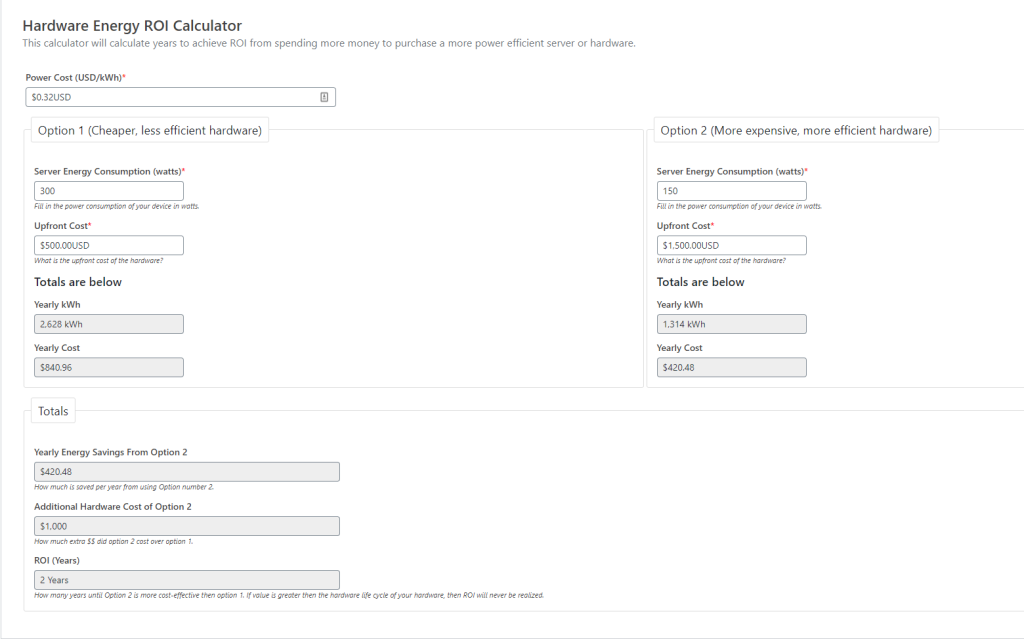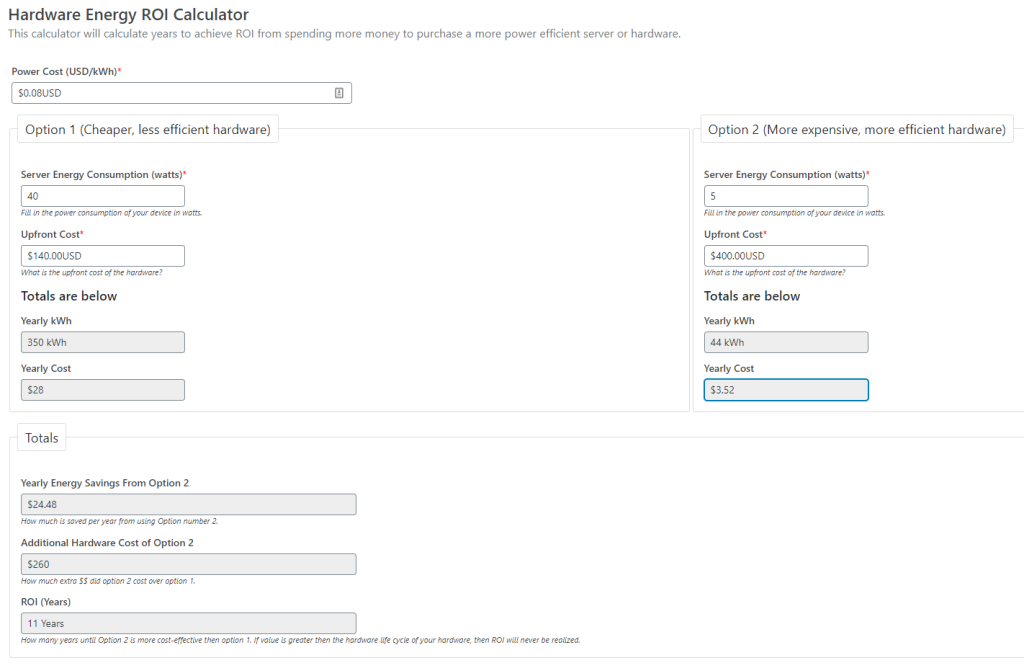Introduction
Multiple times per day, I will be browsing reddit, and see…. MANY posts from users trying to achieve the lowest possible energy consumption regardless of hardware cost.
While, I have made previous posts about this before, I have decided to put all of the math involved front and center to assist users with making their own choices.
Note- Affiliate advertising links are utilized on this article.
ROI Calculator
Examples
Example #1, My R720XD versus a newer server
Here is a simple calculator, to calculate the amount of energy it will cost you per year to run a given piece of hardware, provided its energy consumption, and then, compare those numbers with a more efficient piece of hardware.
The calculator is pre-filled with my data. On the left, represents my Dell R720XD Server, with its 300w average power consumption. On the right, estimates a rough cost for me to build a new server with the required features and performance of my workloads. (The actual number would likely be far higher, as I typically USE 70-100GB of RAM… and RAM is not cheap.)
Results? Used Enterprise Server Wins, By Far.
As you can see in the above example- I would not achieve a ROI for at least 10 years. Yes- my electric bill would be 100$ cheaper per year, however, I still wouldn’t break even for a full decade.
Given hardware usually has a finite lifecycle, I would say anything with a ROI > 7 years is certainly not worth the additional effort or cost.
Example #2 – My R720XD versus a newer server in Germany
This is exactly the same as the first example, with one exception. Instead of using MY local price per kWh, I am going to use the national average cost for germany, which at this time, appears to be roughly 32c / kWh.

Results? Much more expensive, but, efficient option wins by a large margin.
Despite being identical to the first example, except in terms of cost/kwh- The more efficient option wins by FAR here.
Example #3 – Used Corporate SFF vs Intel NUC
In this example, I will be comparing a used HP Z240 versus a brand-new intel NUC. I specifically use this example, because I see LOTS of people opting to get a NUC instead of a used piece of enterprise gear.
HP z240
Ebay: HP Z240 – 8GB DDR4 Ram – i5-6500
As of writing this article, the average cost of one of these shipped, is around 120-140$ USD.
Intel NUC
Amazon: NUC7PJYHN2 (Quad-Core Pentium Silver J5005, 8GB DDR4 RAM,
Cost as of the time of writing this, was 400$.
Hardware Comparison
Off the bat, the older z240’s I5-6500 offers nearly double the performance as the “low power” celeron used in the NUC. Both machines offer 8G of DDR4 ram. Lets ignore the hard drive for now, both options can be had with NVMe storage for basically the same price.
Power Consumption
I DO have multiple HP Z240 desktops laying around my house. One is used for my opnsense firewall, another is used for a gaming PC in my livingroom.
I have personally measured my firewall’s power consumption under normal load, at 25w of consumption. This is a normal HP z240, with a i5-6500, 8G of ram, NVMe, and a 10G NIC. For worst-case scenario, lets assume it uses 40w on average which is WELL above what it actually uses.
I do NOT have a intel NUC laying around. However, its Documentation states < 15 watts under idle/sleep conditions. Lets assume best-case scenario, it uses 5 watts typical. This is likely to be well below its actual usage.
Results? SFF Wins.
Keep in mind, I nearly doubled my ACTUAL usage of my HP z240. I also gave the NUC a unrealistic average power consumption of 5 watts. As well, this was one of the cheapest NUCs you could spec out. Its CPU offers HALF of the performance as the older i5-6500 released in Q3 of 2015.
Effectively, this NUC machine will never reach ROI…. because you are going to throw it in the garbage can in a few months due to its underpowered processor!

Conclusion
Conclusion of this post- Do the math.
If you don’t like to do math? Fine. I provided a calculator above to do the math for you.
Just enter the values. If the ROI is >= 7 Years, I would say go with option 1. If the ROI is < 7 years, Go with option number two!
Obviously, I have relatively cheap electricity(Ignoring the solar panels going up soon as well). What works for me, will not work for someone living in a high-cost area such as germany where the average cost / kWh is 4 times greater then what I would spend.
So- in conclusion…. DO YOUR MATH!!!
